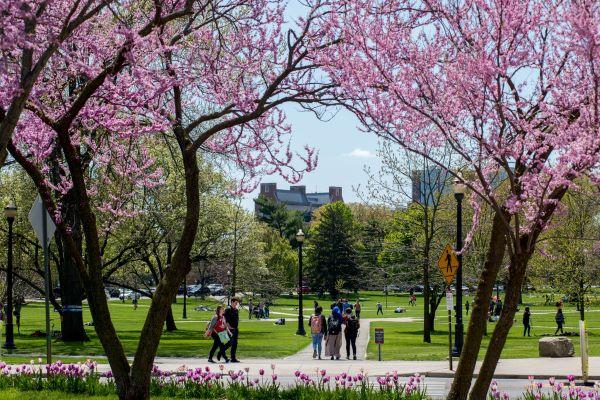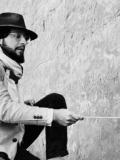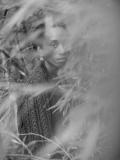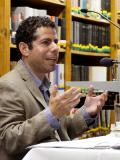Three Arts and Sciences artists among 2025 Guggenheim Fellows

Ahmad Al-Jallad, Sofia Chair in Arabic Studies and a professor in the Department of Near Eastern and South Asian Languages and Cultures; Dionne Lee, assistant professor in the Department of Art; and Paul Reitter, professor in the Department of Germanic Languages and Literatures (GLL), are part of the 100th class of Guggenheim Fellowships.

Al-Jallad is a philologist, epigraphist and historical linguist. His research focuses on developing an evidence-based history of pre-Islamic Arabia, its languages, writing systems and cultures. He is the scientific director and manager of the Online Corpus of the Inscriptions of Ancient North Arabia (OCIANA), the world's central resource for Arabia's pre-Islamic epigraphic heritage.
“Receiving a Guggenheim Fellowship is an incredibly humbling experience,” Al-Jallad said. “It's a profound recognition that reflects not only on my individual work but also on the deeply productive and supportive research environment fostered at The Ohio State University.”
Watch Al-Jallad's TedX talk on YouTube

Lee works in photography, collage and video to examine power, survival and personal history in relation to the American landscape. Using analog photography, her practice engages with social history and climate change while interrogating the limits of human control. Her silver gelatin collages explore American soil as a site of trauma, considering its relevance to both the contemporary landscape and the body, while fragmented imagery in her collages guides narratives tied to memory, emotion and place. These works ultimately intertwine complex associations with ownership, belonging and visitorship.
"It is very surreal to be awarded a Guggenheim Fellowship," Lee said. "I feel deeply fortunate to have such an opportunity as an early career artist. I have the deepest well of gratitude for my letter writers and all that have supported my application and practice, especially the artists and friends who I share this honor with. Absolutely nothing happens alone!"
Read about Lee's work in ASCENT

Reitter’s scholarship focuses primarily on German-Jewish culture and the history of higher education. Of particular concern in both cases have been the links between intellectual and institutional history, the relationship of cultural crisis and cultural innovation, and the effects of technological change on humanistic culture. A practicing translator, Reitter is also interested in the field of translation studies and recently put out an annotated English edition of Marx’s Capital (Vol. 1), which includes his own new translation of the text.
“I can say with total certainty that this wouldn’t have happened if I didn’t have a great work environment, and I want to thank David Horn and Dana Renga, and also my colleagues in GLL, for being generally great to work with,” Reitter said. “The deans and the chair of GLL, Carmen Taleghani-Nikazm, have also supported my Marx translation project in more specific ways that have mattered a lot, and I am grateful to them for that, too.
“I’m now moving on to the second volume [of Marx’s Capital], which contains much less storytelling and satire and therefore doesn’t exert the sort of pull on readers. But since it deals with nothing less than the circulation of capital, it plays a vital role in Marx’s attempt to understand how the capitalist system functions. And I’m the first Anglophone translator of it with access to the eight manuscripts that Marx’s friend Friedrich Engels drew on when he put the book together—Vol. 2, which appeared two years after Marx died, was last rendered into English half a century ago. So for me, this part of the project holds some really exciting editorial and philological challenges and possibilities.”
Listen to Reitter's Voices of Excellence podcast episode
Al-Jallad, Lee and Reitter are three of 198 Guggenheim Fellows for 2025 chosen from a rigorous application and peer-review process out of almost 3,500 applicants. In all, 53 scholarly disciplines and artistic fields, 83 academic institutions, 32 states and the District of Columbia, and two Canadian provinces are represented in this year’s class of Guggenheim Fellows.
Created and initially funded in 1925, by US Senator Simon and Olga Guggenheim in memory of their son John Simon, the John Simon Guggenheim Memorial Foundation has sought to “further the development of scholars and artists by assisting them to engage in research in any field of knowledge and creation in any of the arts, under the freest possible conditions.”
Since its establishment, the Foundation has granted over $400 million in Fellowships to more than 19,000 individuals, among whom are more than 125 Nobel laureates, members of all the national academies, winners of the Pulitzer Prize, Fields Medal, Turing Award, Bancroft Prize, National Book Award, and other internationally recognized honors. The broad range of fields of study is a unique characteristic of the Fellowship program.
